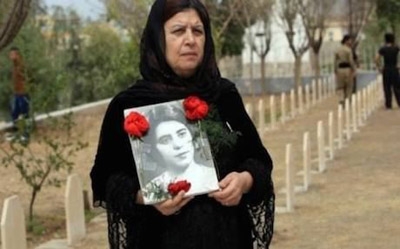Halabja Survivors Traumatized by Yezidi Slaughter

HALABJA, Kurdistan Region — While the persecution of tens of thousands of Yezidis by Islamic militants is being felt by Kurds throughout the world, it is conjuring up especially painful memories for victims of the Halabja genocide.
Halabja became the symbol of Kurdish genocide after 5,000 civilians were killed in a chemical attack by Iraqi forces in arguably the most notorious atrocity of Saddam Hussein’s regime. The deadly cocktail of VX, sarin, tabun and mustard gas also injured about 10,000 people.
Hamida Khan, 33, a woman rights activist from Halabja, burst into tears after seeing footage of Yezidis desperately trying to cram into a helicopter on Shingal mountain, where they had fled attacks by Islamic State (IS/formerly ISIS) extremists.
The United States and Kurdish forces rescued thousands of Yezidis from the mountain and conducted air drops of food and water last week. The approximately 40,000 refugees who fled faced a massive humanitarian crisis and were dying of thirst.
Yezidi leaders say Islamic extremists have slaughtered hundreds of Yezidis and kidnapped at least 500 women and girls. Eighty men were killed on Friday.
Yezidis, who are ethnically Kurdish, practice an ancient religion and are considered devil worshippers by some Islamists.
Khan, who fled the attack on Halabja in 1988, recalled the three-day long journey through the mountains to Iran: dehydration and starvation was widespread, and Iraqi helicopters hovering above would open fire on people who were fleeing. A pregnant woman stepped on a landmine, and another who was weak and starving, was forced to abandon her baby.
“After Anfal and Halabja, Shingal is the third genocide against the Kurds,” she said. “The Yezidis are vulnerable first because they are non-Muslims and second because of their Kurdish ethnicity.”
Hoshmand Morad, 30, who lost his mother, father and sister in the chemical attack, said, “Many ISIS fighters are Arabs which is similar to the Halabja atrocity — the regime was the symbol of Arab chauvinism. But the difference is that ISIS vows to oppress the Yezidis on a religious basis as well.”
“For much of our history, we the Kurds thought we had no friends but the mountains, as was the case in Halabja,” he said. “But this time, it seems, the international community is on our side, and the media is helping by telling the story to the outside world.”
On Aug. 5, Vian Dakhil, a Kurdish Yezidi member of Iraqi parliament, broke down in Iraq’s Parliament session as she delivered an emotional plea to save Yezidis.
“When I watched Vian Dakhil crying for help, I couldn’t stop myself, I started crying, too,” said Abdul Qadir Shadi, 43, a local journalist whose hair has greyed.
“I lost my father, three of my sisters and two nephews overnight. My friends my age don’t look like this.”
Abdul Qadir Shadi, 43, a local journalist, is a survivor of the chemical attack. Like tens of thousands of others, he sought shelter in a basement during the bombardment, and then fled to Iran.
“When I think of Halabja at least we had one open gate — the Iranian border — to escape the brutality of Saddam’s regime. But the Yezidis apparently didn’t have that escape,” Sahdi said.
Hardi Mahdi, 33, a university lecturer at University of Human Development, maintained that Shingal and Halabja are identical from a victim’s perspective: both unwillingly fell victim to indiscriminate atrocities.
The international community has a different perspective, he said.
“Halabja is different in that the town was part of Iraq in 1988, and Iraq targeted Halabja people based on their ethnic background. While the Islamic State is not a state actor, in that it targets the Yezidis because of their religion, saying: convert or die.”
Mahdi argued that the atrocities faced by Yezidis are war crimes.
“The criminals have to be tried at the International Criminal Court, even if it’s done in absentia. That way everyone is held responsible for their actions,” Mahdi said. “Even the terrorists.”
Rudaw













